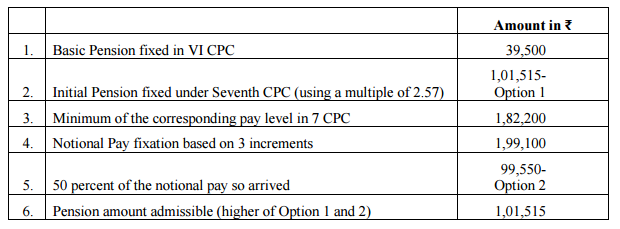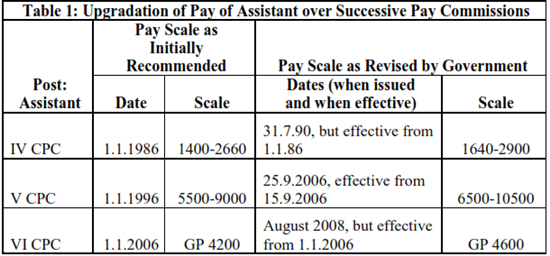LDC-UDC Matter & MACP on Promotional Hierarchy in 7th CPC Recommendation: AIAAS(NG) writes to Confederation
Message from Secretary AIAAS(NG) :-
Com. M Krishnan,
Secretary General,
Confederation of Central Government Employees & Workers,
New Delhi
Message from Secretary AIAAS(NG) :-
This Association has taken up the LDC/UDC, MACP on Promotional
Hierarchy, and other issues related to Administrative Staff with
Confederation. Copy of the letter sent to the Secretary General,
Confederation is given below: All our LDC/UDC friends are requested to
raise the issue in their respective Association to force them to
represent the issue to Confederation/JCM Staff Side.
ALL INDIA ASSOCIATION OF ADMINISTRATIVE STAFF (NG)
MINISTRY OF STATISTICS AND PROGRAMME IMPLEMENTATION
Bhopal,
Dated 25/11/2015
ToCom. M Krishnan,
Secretary General,
Confederation of Central Government Employees & Workers,
New Delhi
Dear comrade,
III The Grade Pay of Assistants/Stenographers of Central Secretariat is brought down to Rs. 4200 from the existing Rs. 4600 and NFSG granted to the UDCs of Central Secretariat has been withdrawn thereby the demand for parity with the Grade Pay of Assistant/UDC of Central Secretariat is turned down.
This is in connection with LDC/UDC, MACP on Promotional hierarchy
and other issues related to Administrative Staff of Subordinate offices.
It is surprising to note that the 7th Pay Commission has turned down
the genuine issue of LDC & UDC on the ground that the government has
stopped direct recruitment for the clerical cadre and gradually phasing
out the existing incumbents. If this is true, it is a matter of great
concern that the Government has chosen to take a unilateral decision on
an important policy matter without consulting the Staff side. The reason
given for rejection of the demand is not convincing.
Besides Confederation/Staff Side JCM, several Departments had
recommended upgradation of grade pay of LDC & UDC of Administrative
Offices especially the LDC & UDCs of subordinate offices of
Government of India.
Extracts of the Pay Commission comments on the matter is given below:
By analyzing the demand of SVP, National Police Academy under Para
11.22.100 the Commission has said “This issue has been dealt in Chapter
7.7. Recommendations made there would apply in this case also”
As against the demand of Directorate of Printing under Para
11.52.32 Commission maintained that “posts like LDC, UDC, Accountant are
common to a number of ministries/ departments. Recommendations
regarding their pay are contained in Chapter 7.7 and Chapter 11.35.”
But, in Chapter 7.7, deals common category, no recommendation for LDC/UDC is given.
However by recording disagreement to increase promotional quota of
MTS to LDC under Para 7.7.37 & 11.35.28 Commission has said that
“government has already stopped direct recruitment for the clerical
cadre and gradually phasing out the existing incumbents, this demand
cannot be accepted.”
But the fact is that Staff Selection Commission is frequently
conducting recruitment for the post of LDC. Combined higher secondary
examination for the selection of LDC also has been conducted recently.
Moreover, no alternative recommendation to replace the LDC post is given
in the report. It is to be noted that the normal ratio of LDC and UDC
in subordinate offices is 5:2 and thus LDCs have been allocated
responsible sections and in many smaller offices LDC alone is handling
the work of entire Administration.
On the other hand rejecting Central Secretariat Clerical service
demand for parity with DEO, the commission observes “Even though the
entry requirements are similar, historically the pay scales of the two
posts have been different. Besides, they comprise two distinct cadres
with different set of roles and responsibilities. Hence, the demand for
parity of pay of LDC with DEOs cannot be acceded to by the
Commission.”(Para 11.35.38).
Historically these cadres may be different set of roles but the
fact is that functions of LDC are more complex than that of DEO and same
was brought before the commission by various
Associations/Administrative Authorities. Earlier pay Commissions have
fixed Pay Scale to DEO considering their work on computer. But today
LDCs are selected on the basis of their expertise in computer operation
also.
By concluding the LDC issue, I give hereunder two comments among
the dozens of comments/e-mail received us on the subject. This signifies
the sufferings of LDCs in subordinate offices.
(1) I am really disappointed with the decision of 7th CPC, I was
hoping that I would get atleast GP 2400 as per their calculation, they
don’t even think about lower classMyself Ashutosh, LDC and I am
appointed on 2012, 3000 KM far from my house and from last 2 years I am
doing the work of cashier along with all the work of Income Tax and
budget, apart from me 4 more LDC’s are working here instead of UDC’s and
they are the backbone of their branch but as per 7th CPC words we are
not having as much responsible work they think LDC’s are recruits only
for “dispatch” and “typing” which is not true.
I request to them, sir please come and see how much responsibility we have and what we are getting,
(2) I am s murugan LDC, handling with pay bills, income tax, TDS
and what are related to taxable income such as LTC encashment, final
bills, HRA claim and etc…
In 7th Cpc report every where it is stated that this is dealt with
chapter 7.7 and 11.35. But, there are no clear instructions for
clerical.
The major error is clerical cadre is not included in common categories (chapter 7).
II Grant of MACP on Promotional Hierarchy:
Even though the Confederation has clarified that the Commission has
recommended MACP on promotional hierarchy, the report of the Commission
is confusing and contradictory. Para 5.1.44 reads in the new Pay
matrix, the employees will move to the immediate next level in the
hierarchy. This can be interpreted as fixation in the same principle as
that for a regular promotion. But Para 11.52.45 is contradictory.
III The Grade Pay of Assistants/Stenographers of Central Secretariat is brought down to Rs. 4200 from the existing Rs. 4600 and NFSG granted to the UDCs of Central Secretariat has been withdrawn thereby the demand for parity with the Grade Pay of Assistant/UDC of Central Secretariat is turned down.
Comrades, Government is bent upon to contractorise all the
Administrative posts below the post of Assistants. The demand for merger
of Grade Pay of LDC & UDC and upgradation to Rs. 2800, as
recommended by the staff side is genuine in accordance with duties
assigned. Confederation/JCM (Staff Side) is requested to please help
LDC/UDC and other Administrative Staff of subordinate Offices to resolve
these genuine issues.
Yours fraternally
TKR Pillai
General Secretary
General Secretary
Source: http://aiamshq.blogspot.in/2015/11/this-association-has-taken-upthe-ldcudc.html



























